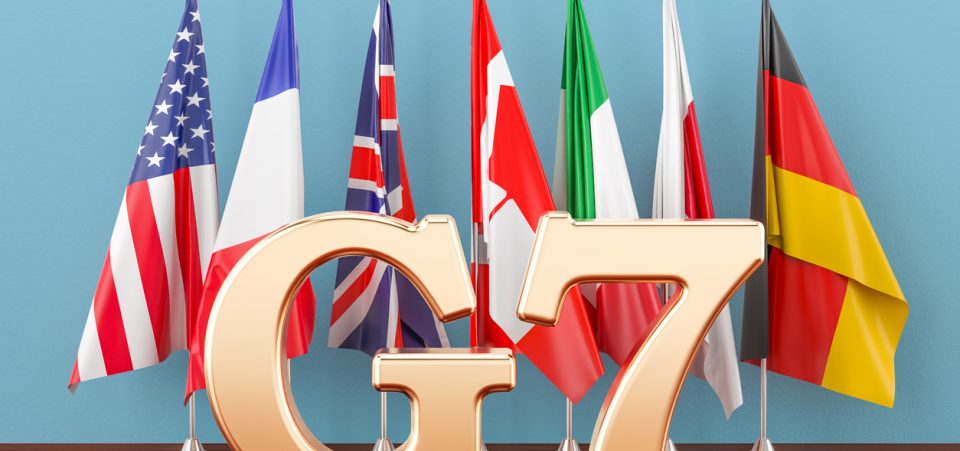The U.S. Dollar and Defense Stocks to Face Pressure After a Divisive G7 Summit
There are potential negative shocks in store for the dollar and for defense stocks.
While many have marveled at the price-to-earnings-ratio-defying performance of many stocks, the defense sector has far and away led the performance charts.
That is, at least until the end of April 2018. As for the dollar, it has been gaining considerably over rival currencies like the euro.
The dollar has risen on expectations that the Federal Reserve will raise interest rates on four rather than three occasions in 2018.
Favorable employment and unemployment numbers have only intensified those prospects.
But two major international events or processes have begun that threaten, for different reasons, the dollar and defense stocks. For related reasons, the G7 has highlighted both.
Trade, the Decline of NATO, and the Dollar
The “G7 of Discord” is how the latest summit of the heads of state and government of the seven most powerful industrialized powers could be remembered.
The disputes between Europe, Japan, and the United States over trade have taken center stage. And the G7 will likely have one of the most contentious editions ever.
The 2018 edition of the G7 will outline two of the most pressing issues in global politics and economics for the next few years: the end of free trade and the restoration of Russia’s role as a partner to the West.
Both will contribute to eroding the influence of the North Atlantic Treaty Organization (NATO) among its European members. The dollar, in the medium and long term, will suffer as a result.
Fading NATO Is Bad News for the U.S. Economy
The slow and inevitable demise of NATO, which has provided an enviable platform for American defense contractors to sell their expensive wares with little competition since the 1950s, will hurt sales of U.S.-made weapons.
Through NATO, the United States has managed to sell such items as the “Lockheed Martin F-35.”
That air-superiority platform could be developed because guaranteed foreign sales helped pay for its costly development. The decline of NATO would cease to provide a ready market for American fighter jets and missiles.
The notion seems counter-intuitive, given an evident rise of global tensions. Nonetheless, President Donald Trump has driven European allies away to seek new alliances and avenues for multilateral defense cooperation.
Cancellation of the Iran Nuclear Deal Could Backfire in the Long Term
Pulling out of the Iran nuclear deal and re-applying direct sanctions against Iran—”the toughest sanctions” package ever, as promised Defense Secretary James Mattis—has cost European companies dearly.
Trump’s sanctions are direct in the sense that they block U.S. companies from doing business with Tehran.
Moreover, there are also secondary sanctions that target foreign companies operating in the United States, which also have interests in Iran.
Europe tried to resist. Still, EU-based oil majors such as Total SA (NYSE:TOT) have announced they would pull out to preserve bigger deals in the U.S.
At the G7 summit, the EU will try to find a compromise with Trump over the secondary sanctions. That will be difficult because Trump has too much domestic ‘political capital’ riding on the canceled Iran nuclear deal.
Containing Iran, especially as it seems all involved parties have accepted—however reluctantly—that President Bashar al-Assad will continue to govern Syria thanks to Russian protection, has become a key aspect of U.S. foreign policy in the Middle East.
Therefore, Trump won’t give in.
Steel and Aluminum Tariffs
And then there are the respective 25% and 10% tariffs on aluminum and steel.
Trump may use those as negotiating leverage to extract more concessions from Europe on Iran.
Yet, nobody has ever bullied partners and friends into submission without suffering some form of eventual retaliation. And the Europeans have been feeling increasingly bullied.
The tendency will be for many NATO partners to contribute less and more reluctantly to the U.S.-led organization, which carries significant importance for U.S. defense sector exports—and demand for the dollar.
New political forces are emerging in Europe in the wake of the 2008 financial crisis, the effects of which linger.
A Clarification on Populism
Many call these parties “populist.” It’s unclear what that means. Indeed, what is happening in Europe has a much more precise explanation than what the cliché of “populism” describes.
Various forces in the past decade have built strength.
They have understood many Europeans’ discontent—from financial and economic crises to a seemingly unstoppable wave of ‘clandestine’ – or rather, uncontrolled – migration from Asia and Africa—better than the dominant centrist parties.
Whether in France, Italy, or Germany (the largest members and the founders of the EU project), the concept of the “center,” or centrism, has characterized politics since the collapse of the Berlin Wall.
The fringe parties from Left and Right have started to bite away at the center, which has proven unable to cope with the pressure of significant processes.
Italy and the PIGS
The South of Europe, or what some call the PIGS (Portugal, Italy, Greece, Spain), have also endured the effects of the euro.
This common currency has benefited Germany and the northern economies.
In Italy, the Five Star Movement, which won the most votes in a recent round of elections, has become the finest representation of what the “collapse of the political center” looks like.
The new government led by Prime Minister Giuseppe Conte is being pulled in different directions: left and right.
As contradictory, as they are, the two opposing parties that form the government both identify the euro as a leading economic problem for Italy.
They also identify NATO—if less explicitly—as problematic at best. NATO membership for many EU countries has implied having to cut off trade with Russia because of sanctions.
Countries like Italy have lost considerable trade with Russia. This has hurt many small and medium businesses.
They exported billions worth of goods to Russia until the Ukrainian crisis of 2014 and the sovereignty referendum in Crimea.
Therefore, no matter how amicably the various leaders will have behaved with each other, the EU has been pushed into a corner. It could choose to look more eastward, by diminishing the role of NATO and the dollar.
Trump Too Busy With North Korea to Worry About EU
That would be a mistake…Trump will have little patience for European complaints. He has the summit with North Korean leader Kim Jong-un to prepare for. His concentration is on the big prize in Korea.
Italy’s Prime Minister Conte appears set to make a strong debut at the G7 in Canada. Given the agenda, he will work jointly to advance European positions in order to better secure concessions later from the EU.
Trump may not care much about the EU and the other powers. Of course, the EU does have tools to put pressure on the United States.
In the longer term, effects of a potentially diminished reliance—and demand for—U.S. military hardware will put bearish pressure on defense stocks.
Already, at the first signs of “peace” with North Korea, Lockheed Martin Corporation (NYSE:LMT), for example, dropped a few percentage points in April.
The Dollar Is the Key to U.S. Power
The United States needs a dominant dollar to be used as a world-trade currency.
The demand for the dollar to buy commodities from oil to metals ensures America’s ability to print as much money as it needs. And that explains why, even with a $21.0-trillion debt, the U.S. economy can keep running.
In the shorter term, the EU can retaliate against the U.S. tariffs targeting the Silicon Valley companies.
The Europeans could fine Alphabet Inc (NASDAQ:GOOG) some $11.0 billion for running a monopoly. Europe can claim that Google’s “Android” operating system has an excessive share of the European—or global—market, damaging its ability to conduct research in alternatives.
Similar claims could be made against all the Silicon Valley or tech majors, including Microsoft Corporation (NASDAQ:MSFT).






